|
|
|
Sort Order |
|
|
|
Items / Page
|
|
|
|
|
|
|
| Srl | Item |
| 1 |
ID:
154742
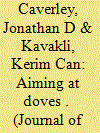

|
|
|
|
|
| Summary/Abstract |
Politicians (and journalists covering them) assume that association with the military has political consequences. We propose and experimentally test conditions under which military images have such effects. We presented subjects with images of the US president before varying backgrounds—including soldiers, students, children, and “ordinary” people. Only the image of soldiers has any significant effect, shifting participant preferences toward spending money on defense over education. The image does this by increasing respondent sense of threats to national security, despite the military’s depiction out of combat and in the background. The soldiers image does little to shift opinion about the president. However, the image has the largest hawkish effect on both the president’s copartisans and the strongest supporters. Given the routine use by many democracies of tactics unlikely to produce images of one’s fellow citizens in combat, the power of more sanitized images to cue hawkish policy preferences requires increased attention.
|
|
|
|
|
|
|
|
|
|
|
|
|
|
|
|
| 2 |
ID:
154740
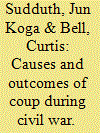

|
|
|
|
|
| Summary/Abstract |
Though approximately one in four coup attempts takes place during an ongoing civil war, scholars have not yet analyzed how the incidence of civil war affects coup attempts and outcomes. We conduct the first empirical analysis of the relationship between ongoing civil war and coup activity, finding (1) war increases the risk of a coup attempt, though (2) war-time coup attempts are significantly less likely to be successful, and (3) the risk of war-time coup is much higher when states face stronger rebel groups that pose greater threats to the political survival of the incumbent government. We attribute these findings to the pernicious effect of ongoing war on the welfare of the military elites and soldiers who have the greatest capacity to execute a coup attempt. As war diminishes their welfare and creates uncertainty about the future of the state, potential plotters become more willing to accept riskier coup attempts than they might plot during peace-time. Coup motivations are greatest when incumbents are more likely to lose their wars, and this causes coup plotters to attempt more and riskier coups when rebels are relatively strong.
|
|
|
|
|
|
|
|
|
|
|
|
|
|
|
|
| 3 |
ID:
154739


|
|
|
|
|
| Summary/Abstract |
How does leverage vary across different mediators? What influence does this variation have on mediation outcomes? Extant literature has equated mediation leverage with material power. Leverage, however, is context dependent and comprised of two dimensions: capability and credibility. Capability leverage is a function of economic resources and power, while credibility leverage derives influence from historical and cultural ties that bolster a mediator’s contextual knowledge of a conflict. I hypothesize that mediators with capability leverage are more likely to achieve short-term success, whereas mediators with credibility leverage generate more durable settlements. I quantitatively test the hypotheses using civil war mediation attempts from 1989 to 2006. I find that capability leverage does indeed contribute to the achievement of short-term success; credibility leverage, however, generates a more durable peace. The results demonstrate the importance of understanding mediation leverage as a context-dependent concept and highlight the potential long-term benefits of softer forms of mediation.
|
|
|
|
|
|
|
|
|
|
|
|
|
|
|
|
| 4 |
ID:
154743
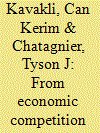

|
|
|
|
|
| Summary/Abstract |
The vast majority of the extant literature on trade and conflict focuses on bilateral trade to determine whether commerce has a pacifying effect upon pairs of states. We argue that this focus neglects a critical role of international trade: creating tension between states that sell similar goods to the global market. We consider this role explicitly and operationalize its effects empirically. Using commodity-level trade data from 1962 to 2000, we show that countries that produce and sell similar goods are generally more likely to fight, even after we take into account their bilateral trade ties and institutional membership in the global economic system. Our findings are robust to numerous alternative specifications and suggest a strong relationship between economic competition in the global market and military conflict between states.
|
|
|
|
|
|
|
|
|
|
|
|
|
|
|
|
| 5 |
ID:
154741
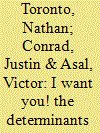

|
|
|
|
|
| Summary/Abstract |
What explains the use of military conscription? Using a new data set of more than 100 countries over a period of 200 years, we examine the determinants of a state’s decision to implement a military draft. We argue that the decision to use conscription is largely dependent on historical factors. Specifically, we contend that former British colonies are less likely to use conscription as a means of military recruitment because of an anticonscription precedent set during the English Civil War. We find that former British colonies are far less likely to opt for conscription, even after controlling for counter arguments relating to a state’s colonial legacy. We also examine a number of existing explanations for the use of conscripts, using the data to arbitrate previous debates. We find that democracies are less likely to implement the draft, while states involved in an interstate war or interstate rivalry are more likely to do so.
|
|
|
|
|
|
|
|
|
|
|
|
|
|
|
|
| 6 |
ID:
154738
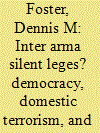

|
|
|
|
|
| Summary/Abstract |
This article develops expectations about the use of military force by democracies facing domestic terrorism. Due to the necessity of balancing effective counterterrorism with liberal acceptability, domestic terrorism typically represents a significant but nonexistential threat to democracies that is ineradicable via repression; as such, it is likely to generate appreciable diversionary incentives. Moreover, the use of force abroad, coupled with counterterrorist strategies that seek to safeguard democratic legitimacy, allows leaders to provide benefits both to citizens who seek retribution against terrorists and to those who value the preservation of liberty. Tests of the correlates of dispute initiation across all democracies, 1970–2000, provide support for this hypothesis. Further analyses reveal that diversion from domestic terrorism is most likely by democratic governments with relatively greater diversionary capacity and with lesser repressive capacity and incentive.
|
|
|
|
|
|
|
|
|
|
|
|
|
|
|
|
| 7 |
ID:
154737
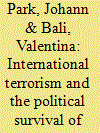

|
|
|
|
|
| Summary/Abstract |
This study examines whether transnational terrorist attacks impact the political survival of leaders. We argue that external security threats, such as those from transnational terrorist incidents, can undermine incumbent target governments by exposing foreign policy failures and damaging society’s general well-being. Yet, terrorism may not destabilize democratic governments as a result of citizens rallying around their elected leaders in threatening times. Focusing on Archigos’ survival leadership data and International Terrorism: Attributes of Terrorist Events’ terrorism data for the 1968–2004 period, we find that autocrats who experience higher instances of transnational terrorist attacks are more likely to exit power. Democrats, however, are relatively secure to the destabilizing influence of transnational terrorism.
|
|
|
|
|
|
|
|
|
|
|
|
|
|
|
|
| 8 |
ID:
154745


|
|
|
|
|
| Summary/Abstract |
This article describes a new data set consisting of precise digital maps of regions that were the subject of interstate territorial disputes in the period 1947 to 2000. Each dispute identified by Huth and Allee is rendered as a polygon corresponding to the area subject to overlapping claims. After describing the data collection procedures and presenting some descriptive statistics, this article develops three novel results that demonstrate the potential of geospatial data to advance our understanding of the causes and consequences of territorial conflict. In particular, I use the data to (1) show how different measurements of the geographic extent of disputes can help unpack the mechanisms through which they dampen international trade, (2) cast doubt on the role of oil deposits in fueling territorial conflict by analyzing the relationship at a finer level of spatial resolution than previously possible, and (3) examine the harmful legacy of territorial conflict on local development in formerly contested regions along the El Salvador-Honduras border.
|
|
|
|
|
|
|
|
|
|
|
|
|
|
|
|
| 9 |
ID:
154744
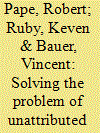

|
|
|
|
|
| Summary/Abstract |
High rates of missing perpetrator information in political violence data pose a serious challenge for studies into militant group behavior and the microdynamics of conflict more generally. In this article we introduce multiple imputation (MI) as the best available method for minimizing the impact of missing perpetrator information on quantitative analyses of political violence, a method that can easily be incorporated into most quantitative research designs. MI will produce unbiased attributions when the reasons for missingness are known and can be controlled for using observed variables, rendering responsibility for unclaimed attacks, “missing at random” (MAR) – which we show is a reasonable assumption in the case of political violence based on current theory of militant group claiming. We lay out the logics and steps of MI, identify variables and data sources, and demonstrate that MI produced better results in the case of the Pakistani Taliban’s response to drone strikes.
|
|
|
|
|
|
|
|
|
|
|
|
|
|
|
|
|
|
|
|
|